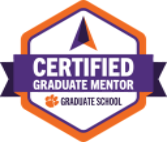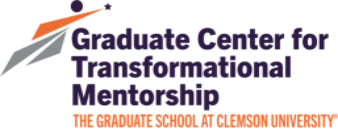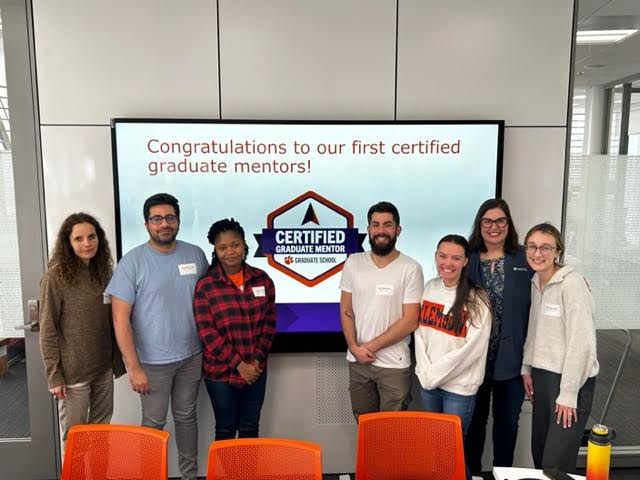- About
-
Academics
- Academics Overview
- Course Numberings
- Deadlines for Completing Your Program
-
Theses and Dissertations
- Theses and Dissertations Overview
- Formatting Requirements
- Templates, Links and Tools
- Plain Language Abstracts
- Plagiarism
- Defending Your Thesis or Dissertation
- Converting Your Manuscript
- Requesting an Embargo
- Submitting
- Revising
- Finishing the ETD Process
- Bound Copies
- Survey of Earned Doctorates
- Thesis and Dissertation FAQs
- Policies and Procedures
- Forms and Requests
- Plan of Study
- Graduation Ceremonies
- Graduate School Interdisciplinary Program
- Admissions
- Professional Development
- Student Services and Groups
Mentoring Up - Mentor Training for Graduate Students

Mentoring is an essential factor in the success of budding scholars and scientists. The goal of training graduate students is to develop skills to enhance the relationship with the graduate student’s mentor and those that the graduate student mentors. The mentorship training by the Graduate Center for Transformational Mentorship (GCTM) at Clemson University meets the guidelines set forth by various government agencies for training grants and is based on the training by the Center for the Improvement of Mentored Experiences in Research (CIMER).
Graduate students can earn a digital badge for participation in 4 workshops. Two workshops are required (Aligning Expectations and Maintaining Effective Communication), choose any other two to receive the badge.

For more information, contact Dr. Karen High (khigh@clemson.edu) or Dr. Marieke Van Puymbroeck (mvp@clemson.edu).


Training sessions that will be available spring of 2024:
-
Aligning Expectations
Mentees will have the knowledge and skills to:
- Effectively establish mutually beneficial expectations for the mentoring relationship.
- Clearly communicate expectations for the mentoring relationship.
- Align mentee and mentor expectations.
-
Maintaining Effective Communication
Mentees will have the knowledge and skills to:
- Communicate effectively across diverse dimensions including varied backgrounds, disciplines, ethnicities, positions of power, etc.
- Accept and use constructive feedback.
- Identify different communication styles/ approaches.
- Use multiple strategies for improving communication (in person, at a distance, across multiple mentors, and within proper personal boundaries).
-
Assessing Understanding
Mentees will have the knowledge and skills to:
- Assess understanding of core concepts and processes as well as the ability to develop and conduct a project and present outcomes.
- Identify reasons for a lack of understanding, including expert-novice differences.
- Use multiple strategies to enhance understanding across diverse disciplinary perspectives.
-
Promoting Independence and Research Self-Efficacy
Mentees will have the knowledge and skills to:
- Define independence, its core elements, and how those elements change over the course of a mentoring relationship.
- Identify the benefits and challenges of fostering independence, including the sometimes conflicting goals of fostering independence and achieving grant-funded research objectives.
- Identify signs of self-efficacy that resonate when conducting research related tasks.
Define self-efficacy and its four sources.
- Articulate their role in building their own research self-efficacy.
- Assess the influence of others on their research self-efficacy.
- Devise strategies to support others’ research self-efficacy.
-
Establishing a Practice of Inclusion
Mentees will have the knowledge and skills to:
- Increasing understanding of community, engagement, belonging and access, and their influence on mentor-mentee interactions.
- Recognize the impact that conscious and unconscious assumptions, preconceptions, biases, and prejudices bring to the mentor-mentee relationship and how to manage them.
-
Fostering Work-Life Integration
Fostering Work-Life Integration
Mentees will have the knowledge and skills to:
- Recognize the importance of proactive well-being for mentors and mentees.
- Understand both the protective as well as the risk factors for graduate student mentee mental health.
- Identify concrete strategies for support if you are experiencing mental health challenges and are already seeking counseling or other resources.
Developing Your Mentoring PhilosophyMentees will have the knowledge and skills to:
- Reflect on the mentee education experience.
- Reflect on any intended behavioral or philosophical changes across the mentoring competencies.
- Articulate an approach for working with mentors in the future.
-
Promoting Professional Development
Mentees will have the knowledge and skills to:
- Identify the roles mentors play in their overall professional development.
- Develop or revise their individual development plan IDP.
- Recognize and engage in open dialogue on balancing the competing demands, needs, and interests of mentors and mentees, e.g., research productivity, grant funding, creativity and independence, career preference decisions, non-research activities, personal development, work-family balance, etc.
-
Capstone: Building your Mentoring Philosophy

